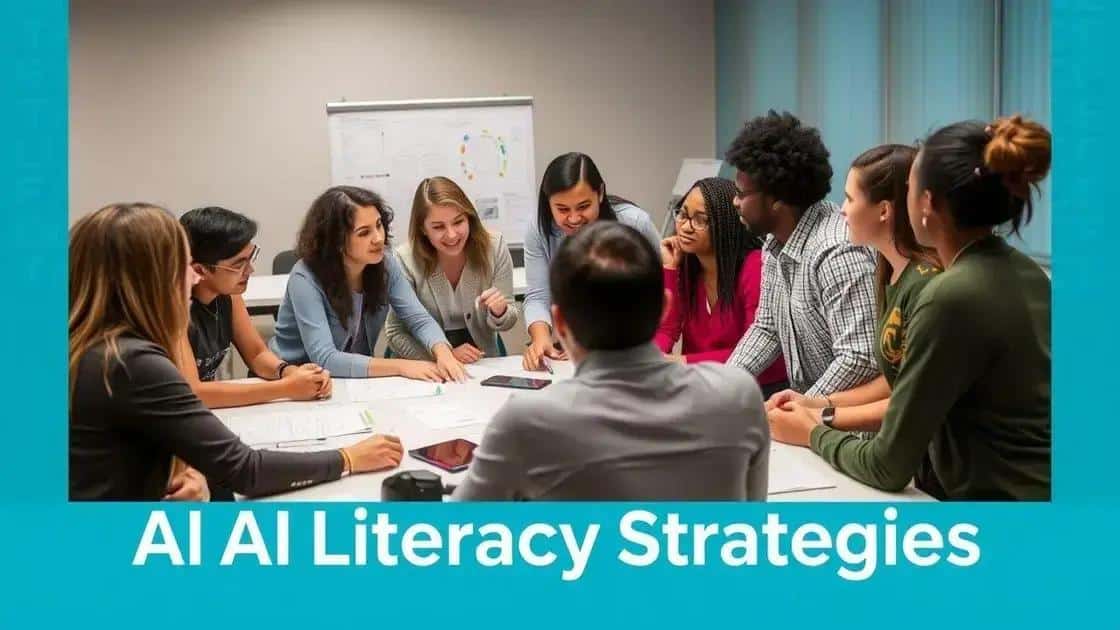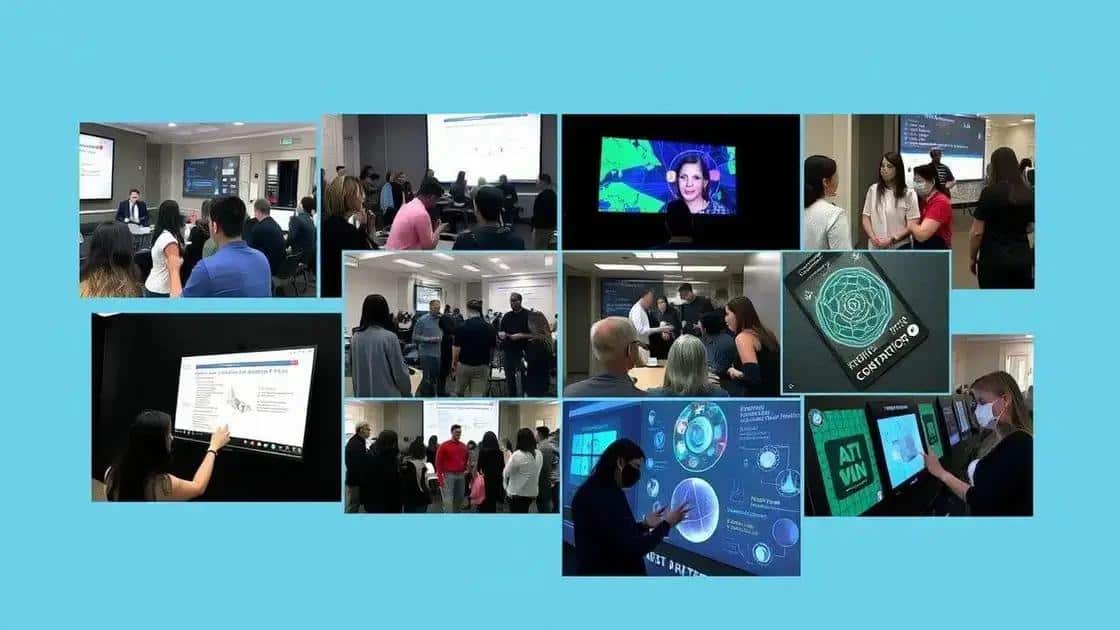AI literacy campaigns insights: boosting public understanding

AI literacy campaigns are initiatives designed to educate individuals about artificial intelligence, focusing on clear communication, engaging content, and tailored outreach to enhance understanding and responsible use of AI technologies.
AI literacy campaigns insights are essential in our rapidly advancing technological landscape. As AI becomes more prevalent, understanding its implications becomes crucial for everyone. Let’s explore how these initiatives promote awareness and practical knowledge.
Understanding AI literacy: what it means
Understanding AI literacy is crucial in today’s technology-driven world. It means having the knowledge and skills to comprehend the basics of artificial intelligence, allowing individuals to engage with this technology effectively.
At its core, AI literacy encompasses various aspects, including the principles of AI, its applications, and its impact on society. By grasping these elements, people can proactively participate in discussions about AI and its implications for their lives.
Key components of AI literacy
The foundation of AI literacy includes several key components that everyone should understand:
- Basic definitions of AI and related terms
- Cultural and ethical considerations surrounding AI
- The ability to critically assess AI technologies
- Awareness of how AI impacts daily life
These components help individuals navigate the digital landscape. Knowledge of basic definitions allows for better understanding and demystifies the technology. Furthermore, acknowledging the ethical implications of AI helps foster responsible use.
It’s also essential to recognize the benefits that AI literacy brings. For instance, individuals who are familiar with AI technologies are better equipped to make informed choices about their use. They can advocate for fair practices and identify potential issues arising from AI decisions.
Why is AI literacy important?
In a world increasingly influenced by AI, enhancing AI literacy is not just beneficial; it is necessary. Understanding AI helps combat misinformation and equips individuals to engage in critical conversations about its role in society.
Moreover, AI literacy promotes inclusivity. When more people understand AI, it allows for a wider range of perspectives and insights, enriching discussions around the technology. This understanding can drive innovation and ensure that AI develops in ways that serve all members of society.
Key strategies for successful campaigns

Implementing key strategies is vital for the success of AI literacy campaigns. A well-planned approach can significantly enhance community engagement and understanding of artificial intelligence.
First, it’s essential to identify your target audience. Knowing who you want to engage helps tailor your content and messaging. For example, students, professionals, and the general public have different needs and understanding levels regarding AI.
Effective messaging and communication
Once you know your audience, clear messaging is crucial. Your communication should be:
- Simple: Use straightforward language to explain complex concepts.
- Relatable: Connect AI concepts to real-life situations that your audience can understand.
- Interactive: Encourage participation through Q&A sessions or discussions.
Interactive formats can enhance understanding. Workshops, webinars, and community forums provide excellent avenues for direct engagement. When people can ask questions, they often feel more invested in the learning process.
Another essential strategy includes using diverse media formats. Combining videos, infographics, and text can cater to different learning styles. For instance, a video showcasing AI applications in everyday life can be impactful for visual learners.
Partnership and collaboration
Forming partnerships with local organizations, schools, and tech companies can boost outreach efforts. These partnerships can provide valuable resources and knowledge-sharing opportunities.
Moreover, leveraging social media platforms can help spread the word about your campaigns. Regular posts, engaging content, and collaborative efforts with influencers can reach wider audiences.
Lastly, evaluate and adapt your strategies based on feedback and results. Surveys and direct feedback from participants can help refine your approach, ensuring that the campaigns remain relevant and effective in enhancing AI literacy.
Measuring the impact of AI literacy initiatives
Measuring the impact of AI literacy initiatives is essential to understand their effectiveness. It helps organizations and stakeholders see what works and what needs improvement.
One way to measure this impact is through surveys. Gathering feedback before and after campaigns can show changes in knowledge and attitudes towards AI. This data is vital for assessing the initiative’s impact.
Key metrics to consider
When evaluating the success of AI literacy initiatives, consider several key metrics:
- Changes in participants’ knowledge about AI
- Engagement levels during the campaign activities
- Participants’ feedback and satisfaction ratings
- Behavior changes related to AI usage
Tracking attendance and participation rates also gives insight into how well the initiative attracts an audience. High engagement often indicates that the content resonates with participants.
Another valuable approach is to observe long-term outcomes. For instance, are the participants applying their AI literacy in their daily lives or in their workplaces? Gaining practical skills should translate into increased confidence around AI technologies.
Using technology for measurement
Technology can play a significant role in measuring the effectiveness of these initiatives. Online platforms can collect data efficiently, and analytics tools can help analyze the information. Dashboard tools simplify the evaluation process and visualize the impact metrics.
Moreover, sharing the findings with stakeholders is crucial. Publicly accessible reports showcasing the success of AI literacy initiatives can promote transparency and encourage further support. Highlighting success stories can inspire more people to participate in future campaigns.
Case studies showcasing effective AI outreach

Case studies showcasing effective AI outreach demonstrate how organizations successfully educate and engage communities about artificial intelligence. These examples can inspire new campaigns and strategies.
One notable case study comes from a local school district that implemented an AI literacy program for students. The program included interactive workshops and hands-on activities. As a result, student interest in STEM fields increased significantly, with many expressing a strong desire to pursue careers in technology.
Community engagement in action
Another example involves a non-profit organization that focused on adults in underserved communities. They hosted various information sessions and used accessible language to explain fundamental AI concepts. This approach not only raised awareness but also empowered participants to feel confident in their ability to understand AI technologies.
- Workshops conducted in community centers
- Partnerships with local tech companies for resources
- Online webinars to reach a broader audience
- Real-life applications of AI highlighted during sessions
These initiatives showcased the importance of tailoring content to specific audiences. Engaging presentations, real-life examples, and hands-on activities proved to be effective strategies for increasing AI literacy.
In another case, a tech company launched a successful outreach campaign by collaborating with local universities. They created a series of informative videos and interactive seminars that focused on how AI affects different industries. This initiative led to improved community trust in AI technologies.
Evaluating success through feedback
Measuring the success of these outreach efforts involved collecting feedback from participants. Surveys and interviews helped assess knowledge gains and overall satisfaction. This data guided future initiatives and highlighted areas for improvement.
Effective communication is a recurring theme in these case studies. Providing clear, engaging content that resonates with audiences is key to successful AI outreach. Each organization’s unique approach offers insights into how to create impactful programs that foster understanding and enthusiasm for AI.
FAQ – Frequently Asked Questions about AI Literacy Campaigns
What is AI literacy, and why is it important?
AI literacy refers to understanding the basics of artificial intelligence, its applications, and impact. It’s important because it allows individuals to engage responsibly with technology.
How can I measure the success of an AI literacy initiative?
Success can be measured through participant surveys, engagement metrics, and tracking knowledge gains before and after the campaign.
What strategies work best for engaging different audiences in AI education?
Using clear communication, interactive workshops, diverse media formats, and tailored outreach can effectively engage various audience segments.
What role do case studies play in developing AI literacy campaigns?
Case studies provide insights into successful initiatives, helping organizations learn from past experiences and improve their outreach strategies.





